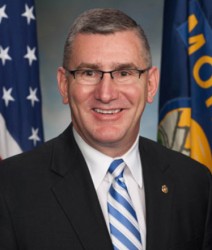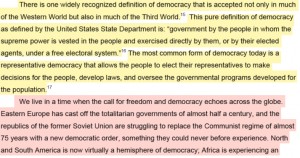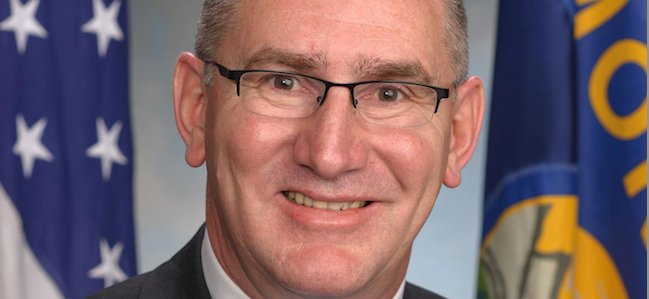The Senator John Walsh Plagiarism Scandal
 Update 7/26/14: The Army War College has announced that it has opened an investigation into senator Walsh’s thesis, the first meeting is expected to take place no earlier than August 15.
Update 7/26/14: The Army War College has announced that it has opened an investigation into senator Walsh’s thesis, the first meeting is expected to take place no earlier than August 15.
Senator John Walsh, already behind in his bid for reelection, suffered another setback in his campaign, and possibly his political career, when Jonathan Martin at the New York Times accused Senator Walsh of plagiarizing his master’s thesis. He then backed up his accusations with a marked up version of Senator Walsh’s thesis, with the plagiarized passages highlighted in two different colors.
Senator Walsh is not the first politician in recent memory to have been caught plagiarizing. Late last year, Senator Rand Paul was accused of plagiarism in two of his speeches, a book and an op-ed and Vice President Joe Biden faced plagiarism allegations both in 2008 and 1987. The 2008 election also saw allegations be hurled at now-President Barack Obama and his opponent John McCain.
But while plagiarism scandals routinely end political careers in Germany, in the U.S., such scandals are usually more than recoverable, so much so that the Washington Post recently called it a “Petty political crime.” However, for Walsh, the implications of the scandal are much more dire. His campaign is already embattled, behind in polls and funding, and the plagiarism scandal gives his opponents an opening to attack Senator Walsh’s record.
It could easily be the end of Senator Walsh’s political career.
But in addition to the issues it raises for Senator Walsh, the scandal raises other, possibly more important issues about the ways in which degrees, in particular higher degrees, are awarded and the roles those degrees play in how we choose our political leaders.
The Basics of the Senator John Walsh Plagiarism Scandal
 Senator John Walsh is currently the Junior Senator for the state of Montana. He was appointed to the position in February of 2014 after Senator Max Baucus, also of Montana, was appointed the Ambassador to China. Before his appointment, Senator Walsh was the Lieutenant Governor of the state, having taken off in 2013. Prior to that, he had a career in the military where he served as a Colonel in the Army and the adjunct general for the Montana National Guard.
Senator John Walsh is currently the Junior Senator for the state of Montana. He was appointed to the position in February of 2014 after Senator Max Baucus, also of Montana, was appointed the Ambassador to China. Before his appointment, Senator Walsh was the Lieutenant Governor of the state, having taken off in 2013. Prior to that, he had a career in the military where he served as a Colonel in the Army and the adjunct general for the Montana National Guard.
It was near the end of his military career that Senator Walsh attended the United States Army War College to work on his masters degree in strategic studies. As a final hurdle to obtaining his degree, Senator Walsh penned a 20-page thesis entitled, “The Case for Democracy as a Long-Term National Strategy”. The thesis was accepted and, in 2007, at age 46, Senator Walsh received the degree.
However, according to The New York Times, much of the content in that thesis was not original. Over 25% of it, including the key recommendations and much of the conclusions, were verbatim or near-verbatim plagiarism from other sources that were not cited at all in the paper. Most of the remainder was content that where the sources were cited, but it was not indicated Senator Walsh was quoting from the text directly.
All totaled, according to an analysis performed using iThenticate, less than a quarter of the paper was original.
Senator Walsh, for his part, is not denying the allegations. However, he is saying that he was under treatment for PTSD during the time he wrote the thesis and that his judgment was impaired.
As for, the War College, it has said it is opening up an investigation into the matter and plans on running the paper through an online plagiarism checker to try and replicate the results. They added they will not treat him different than any other student.
Still, for Senator Walsh, his more immediate concern is not his degree, but his political campaign, which is looking very dire.
Comparisons to the Joe Biden Scandal
Of all the U.S. plagiarism scandals, the most natural comparison is the Vice President Joe Biden scandal from 1987.
At the time, Vice President Biden was running for President, specifically, he was seeking the Democratic Party nomination. He was already struggling in the race when it was discovered that, in 1965, he had used five pages from a law review article without attribution in a 15-page paper he submitted in the course of earning his law degree at Syracuse University College of Law.
Biden was caught while still a student and but was allowed to continue his studies and eventually graduate.
However, the scandal sank Vice President Biden’s attempt at achieving the Presidency that year, delivering what was widely seen as a final blow to his campaign.
Still, the scandal didn’t ruin Vice President Biden’s political career, as his current title indicates. In 1990 he won re-election to the Senate with more than 60% of the vote and, as most know, he was nominated to be President Barack Obama’s Vice President in 2008, an election he and President Obama won.
The parallels are fairly clear, but they include three key points:
- Clear Cases of Plagiarism: Both Senator Walsh and Vice President Biden’s plagiarism cases were very clear cut, without much room for dispute.
- Took Place in College: Both cases happened not as part of their political careers, but rather, their academic careers.
- Both Were Struggling in Their Elections: Both men were already behind in their elections when the scandal broke, likely delivering a death blow to the campaign.
However, the big difference is the position that the candidates were in at the time the plagiarism scandal broke. Vice President Biden was first elected to the Senate in 1972. Senator Walsh, on the other hand, was nominated to his post just last year. Also, Vice President Biden was running for a new office while Senator Walsh was running for re-election of the only office that he has held so far.
In short, where Vice President Biden was able to bounce back and continue his political career, Senator Walsh has nowhere to bounce back to. His political career may not be over, but he will have to start anew.
However, Senator Walsh’s political future may be the least of the problems raised by his scandal.
For me, the bigger and more difficult question is simple: How was this thesis accepted in the first place?
2007 wasn’t exactly the dark ages of plagiarism detection. In 2008, I attended the 3rd International Plagiarism Conference, which heavily touted the progress of plagiarism detection solutions over the past two years. Of course, Turnitin’s origins go all the way back to 1996 and other tools, including simple search engines, were available in 2007 to detect the rampant copying.
But even without the aid of the technology, most of the plagiarized text was cited, just not indicated to be quotes. This means that, if an instructor followed up on the cited sources, investigating just a few, they likely would have noticed the similarities immediately.
Even the most basic plagiarism checks likely would have revealed problems with this paper, though it still managed to slip through and a master’s degree was awarded on its merit.
While it would be easy to blame this one bad essay but the truth is the only reason Senator Walsh was detected was because of his election and the extra scrutiny it brought to his work. If he had entered the private sector or stayed with the military, it’s unlikely anyone would have ever known.
Countless masters and doctorates have been awarded on the back of plagiarized papers with no one noticing. Most students have their papers evaluated when they submit them and never again, Senator Walsh was just an anomaly.
If these advanced degrees are to be taken seriously, the papers that are required to earn them should be put through proper rigor, including checking for all ethical issues, not just plagiarism.
While it means more time and work, a tough sell for universities as they are already being forced to cut back on so many things, it’s that rigor that gives degrees their meaning and makes them more than just stepping stones along a career path.
Bottom Line
Senator Walsh probably wasn’t going to win the election before the plagiarism allegations and he almost certainly won’t now. Whether or not he will have a political career after this is up to both himself and the voters. Still, that looks unlikely as well.
While it’s tempting to bill Senator Walsh as an example of why cheaters never prosper, the opposite is most likely true. Senator Walsh is an outlier, someone whose paper was evaluated years after he graduated college. Very few people go through that and, as this case shows, clearly plagiarized papers can be used to earn very high degrees.
Senator Walsh plagiarized but he is not alone, other than the fact he was caught. Someone not in a closely-watched Senate race probably never would have been caught at all, despite how flagrant the plagiarism was.
This case isn’t a reason for anti-plgiarists to cheer, but for them to be worried. The issue is much deeper than Senator Walsh and there’s no easy way to tackle it.
Want to Reuse or Republish this Content?
If you want to feature this article in your site, classroom or elsewhere, just let us know! We usually grant permission within 24 hours.
